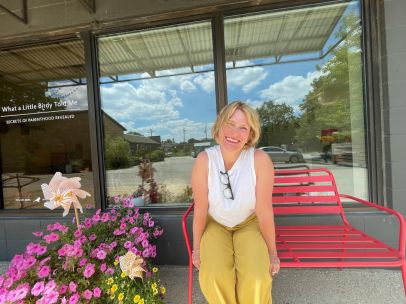A new support group is forming in Lawrence to provide a safe space for the growing number of girls and young women who are diagnosed with Attention-Deficit/Hyperactivity Disorder.
Established by Meagan Lohmeyer and Jenny Baker Powers, The Green House is intended to give young women with ADHD a forum where they can discuss the challenges they face when coping with an illness that can sometimes feel quite isolating.
The idea for The Green House came after Lohmeyer’s daughter, Bella Ogborn, was diagnosed with ADHD in summer 2021. She had always been a bright student and athlete, but during her freshman year at Bishop Seabury, Ogborn suddenly found herself struggling with things that other teenagers seemed to navigate naturally.

“I was always having to make up work and talking with teachers to try to stay on track,” Ogborn said. “I knew something was off. I was getting frustrated with people thinking I was lazy. I didn’t want people to think of me as somebody who didn’t care about my grades and stuff like that.”
Baker Powers, a learning support specialist at Bishop Seabury, said she knew Ogborn’s struggles weren’t for lack of effort.
“I saw how hard she was working,” Baker Powers said. “Clearly she is an intelligent young person. It wasn’t that she wasn’t capable.”
Once school was out, Lohmeyer took Ogborn to the KU Child and Family Services Clinic, which offers services including developmental and psychological assessments on a sliding scale to anyone in Northeast Kansas. A series of tests administered over several weeks led to a diagnosis that is becoming increasingly common among young women: ADHD along with anxiety and depression.
First identified in 1902, ADHD is a disorder that is most commonly identified in elementary school years, but can be can be diagnosed into adulthood. According to the Centers for Disease Control and Prevention, approximately 6.1 million children between the ages of 2 and 17, or 9.4%, were diagnosed with ADHD in 2016.

Studies estimate that approximately half of all children with ADHD are girls, yet statistically boys are more than twice as likely to receive the diagnosis. Research published by the National Institutes of Health attributes some of the discrepancy to differences in symptoms and common accompanying disorders that make ADHD look quite different. Symptoms in boys, for example, frequently show themselves as hyperactivity, while girls often internalize feelings leading to behaviors that look more like inattentiveness.
An educator for more than 25 years, Baker Powers also owns What a Little Birdy Told Me, a consulting firm for families seeking help with behavioral challenges and school-related issues. Her own daughter, who was diagnosed with ADHD as an adult, seemed do fine through high school graduation, but struggled to cope with college life. Baker Powers said she didn’t recognize the symptoms of ADHD at the time, which resulted in her daughter not having a diagnosis or tools that might have helped her earlier in life.
“I have spent a lot of time regretting telling her to work harder and try harder,” she said. “It was hard for me to relate to. I regret that I wasn’t more supportive. I wish I had handled that differently as a mother.”
Lohmeyer, too, at first failed to realize that Ogborn’s struggles were related to a disorder rather than simply typical teenage behaviors.
Because ADHD symptoms are often turned inward in girls and women, anxiety and depression frequently accompany a diagnosis. Lohmeyer said she worried that her admonishments caused Ogborn further stress.
“As girls and women we are trained to have ourselves together, to put on a face and keep things buttoned up,” Lohmeyer said. “She internalized a lot of things, which perpetuates that vicious cycle.”
Both Lohmeyer and Baker Powers said that although it was good to have a strong support system through family and school, they both saw a need for a space where girls and young women with an ADHD diagnosis could come together and talk about the issues they face.

Ogborn agreed that while it was nice to have adults helping her, it wasn’t a substitute for being able to talk to peers with similar struggles.
“I have a lot of support systems around me and everybody’s always helping me,” Ogborn said. “At the same time, it gets a little hard. They get frustrated with me at times. They don’t understand how it feels.”
Baker Powers said that feeling of being alone and misunderstood led to the idea for The Green House. Since they began sharing information about it, the new group has garnered quite a bit of interest. Although the first group is for young women, Baker Powers said the Green House was established on inclusivity and could grow as needed to accommodate other groups.
Currently the plan for meetings is somewhat amorphous. Initially there will be some direction from Baker Powers, but the goal is for members to lead, and eventually take the group in whatever direction fits their needs.
“We’re hoping that these girls can share strategies together,” she said. “Just like anything else in life, if it comes from someone with a shared experience it’s going to be more relevant.”
The Green House, which plans to gather on the third Sunday of each month, will have meetings in Studio 1 at 512 E. Ninth St. The first meeting is scheduled for 1:30-2:30 p.m. Sunday, Feb. 20.
Find more information about The Green House online at whatalittlebirdytoldme.com.
Note: Article updated to add photos at 4:10 p.m. Sunday, Feb. 6
Don’t miss a beat … Click here to sign up for our email newsletters

Andrea Albright (she/her), reporter, can be reached at aalbright (at) lawrencekstimes (dot) com. Read more of her work for the Times here. Check out her staff bio here.





